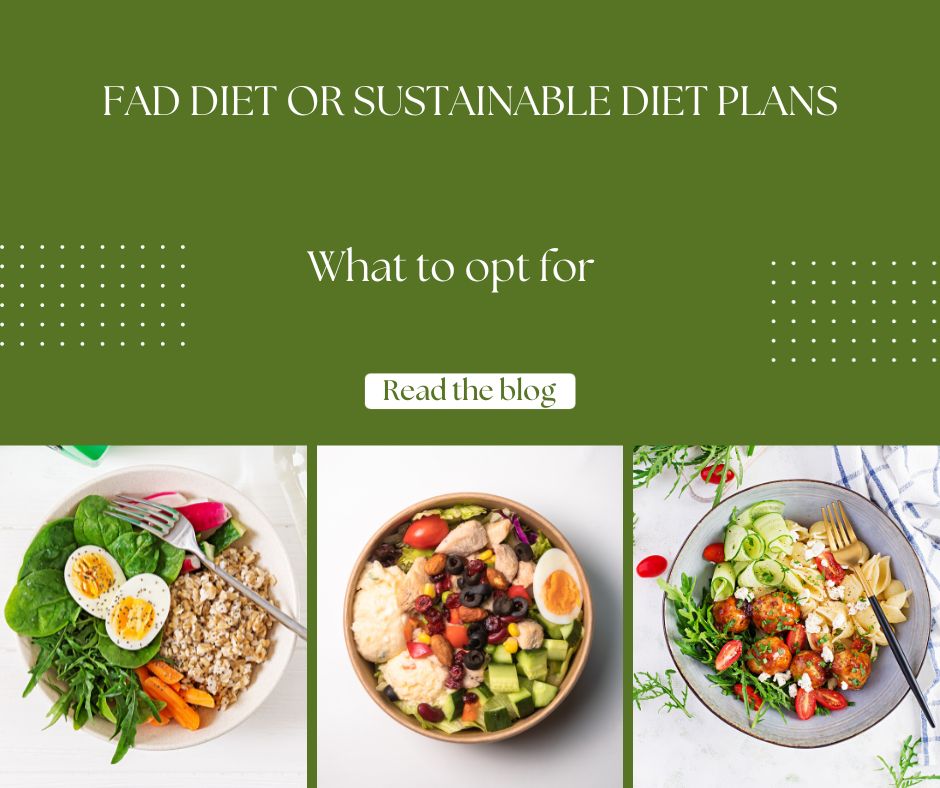Fad Diets vs. Sustainable Weight Loss Plans
In a world obsessed with quick fixes and instant gratification, it’s no surprise that fad diets often capture our attention. These diets promise rapid weight loss, often accompanied by extravagant claims of shedding pounds in a matter of days or weeks. However, when it comes to achieving and maintaining a healthy weight, the battle between fad diets and sustainable weight loss plans is a crucial one.
Let’s explore the pros and cons of each approach to help you make informed choices about your weight loss journey.

Fad Diets Pros
- Rapid Weight Loss- Fad diets can lead to quick initial weight loss, which can be motivating for those seeking immediate results.
- Simple Rules- Most fad diets come with straightforward rules, making it easy for people to follow without much thought or preparation.
- Novelty and Hype- The allure of something new and trendy often attracts people to fad diets, sparking initial enthusiasm.
Fad Diets Cons
- Unsustainability- Fad diets are typically based on extreme restrictions, making them hard to maintain over the long term. Once you revert to your regular eating habits, the weight often returns.
- Nutrient Deficiency- Many fad diets cut out essential nutrients, potentially leading to deficiencies that harm your overall health.
- Yo-Yo Effect- The rapid weight loss followed by regaining the weight (and often more) can lead to a frustrating cycle of weight gain and loss, also known as the yo-yo effect.
- Lack of Scientific Backing- Most fad diets lack proper scientific evidence to support their claims, leaving followers at risk of harm and disappointment.
On the other hand, sustainable weight loss will support one with long term weight loss achievement that is good for the body.
Sustainable Weight Loss Plans Pros
- Long-Term Success- Sustainable weight loss plans focus on gradual, sustainable changes that can be maintained for life, reducing the chances of regaining lost weight.
- Healthy Habits- These plans encourage the development of healthy eating habits, fostering a better relationship with food and promoting overall well-being.
- Balanced Nutrition- Sustainable plans often include a balanced mix of nutrients, ensuring that you don’t deprive your body of essential vitamins and minerals.
- Scientifically Supported- These approaches are typically backed by scientific research and have been proven effective for long-term weight management.
Sustainable Weight Loss Plans Cons
- Slower Progress- Sustainable weight loss plans usually yield slower initial results, which can be less motivating for some individuals.
- Requires Patience- Sticking to a sustainable plan requires patience and dedication, which can be challenging in a world where instant gratification is often prioritized.
- Personalization Needed- What works for one person might not work for another. Sustainable plans often require customization to suit an individual’s unique needs and preferences.
The battle between fad diets and sustainable weight loss plans ultimately comes down to the goals and preferences of the individual. If you’re looking for a quick fix or a jumpstart to a weight loss journey, a fad diet might offer temporary satisfaction. However, it’s crucial to be aware of the potential downsides and risks associated with these diets.
On the other hand, if your goal is to achieve lasting and sustainable weight loss while promoting overall health and well-being, a sustainable weight loss plan is the better choice. It may not promise instant results, but it offers a path to long-term success, improved eating habits, and better health.
Ultimately, the decision should be based on what you value most- a brief period of rapid weight loss or a lifelong commitment to a healthier, happier you. Keep in mind that consulting with a healthcare professional or registered dietitian is always a wise step to ensure that your chosen approach aligns with your specific needs and health conditions.
